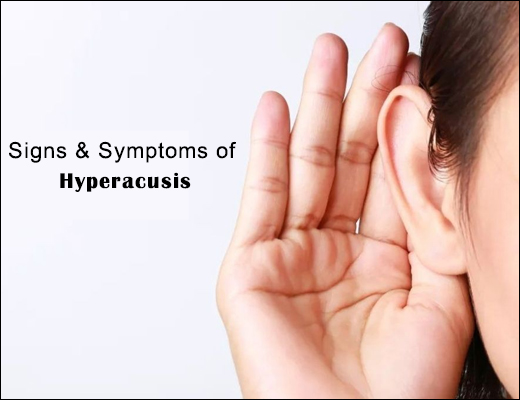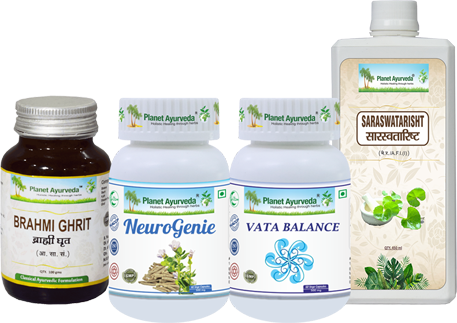What Is Hyperacusis And It’s Treatment In Ayurveda?
Abstract
Hyperacusis is a disorder where any type of normal sound can seem like a loud noise to the patient. This condition takes a toll on the mental health of the patient making them irritable, troubled and even depressed. Hyperacusis can impact social life and general well-being. The onset of this disease can be either sudden or gradual. It may seem weird to know but individuals with hyperacusis may find soft noises like chirping of birds or rustling of paper uncomfortably loud. It isn’t necessary for hyperacusis patients to have a history of abnormal hearing before but it is often accompanied by tinnitus. This disorder can occur either in one or both ears at the same time. Research says that around 5-15% young adults and 10-15% adults suffer from hyperacusis. Reports also state that 1 in every 1,000 people who have tinnitus also have hyperacusis.

Introduction
Hyperacusis is a rare hearing disorder that causes sounds to sound unbearably loud which would otherwise seem normal to most people. Individuals with hyperacusis can also find general environmental sounds to be extremely loud. The condition of hyperacusis is also known as decreased sound tolerance. People with normal hearing ability can experience sounds with a varying degree of loudness. On the contrary, hyperacusis patients experience all sounds in general with an increased degree of volume. For example, water running from a tap, the voice of a kitchen chimney working, the sound of pages of a book flipping, two or more people talking or laughing.
Causes Of Hyperacusis
- With an exact cause to still be unknown, it can be said from research that damage to the auditory nerve can cause hyperacusis. The function of the auditory nerve is to carry sound signals from the inner ear to the brain to make hearing possible.
- Another reason can be damage to the facial nerve. The facial nerve controls a muscle located in the middle ear known as stapedius. It aids in reducing vibrations caused by loud noises, as a result sound intensity is decreased. A lot of conditions that are associated with hyperacusis involve damage to facial nerve for e.g. facial paralysis, Ramsay Hunt syndrome, Lyme disease.
Factors that contribute to hyperacusis include:
- Chronic exposure to loud noises like high volume-high intensity music, construction sounds etc.
- Injury to the head
- Surgical procedure causing facial nerve damage
- Sudden exposure to a very loud noise such as a gunshot or a blast
- Anxiety disorder has been observed in half of the patients of hyperacusis
Risk Factors Of Hyperacusis
- Over time, regular exposure to loud noises like in the profession of a disc jockey, a rock band musician, construction site worker are more likely to suffer from hyperacusis.
- Patients that are taking certain medicines on a regular basis like non-steroidal anti-inflammatory drugs (NSAIDs), some antibiotics and a few cancer medications. These can lead to hyperacusis.
- Serious head injuries increase the risk of hyperacusis.
- Viral infections affecting the inner ear can cause hyperacusis.
- There are many other conditions that make a patient susceptible to hyperacusis like tinnitus, Williams syndrome, Lyme disease, and Tay-Sachs disease.
Symptoms Of Hyperacusis
- Experiencing ordinary sounds to be unbearably loud.
- One’s own sound seems uncomfortably loud.
- Ringing in ears.
- Ear pain.
- Pressure in ears like you get at high altitudes.
- Disturbed sleep
- Fatigue
- This condition can negatively impact mental and social health leading to anxiety and depression.
Signs Of Hyperacusis
- Irritability due to constant noises
- Difficulty concentrating
- Cranial nerve damage may be observed
- The loudness can make one lose their balance or lead to seizures
Diagnosis Of Hyperacusis
- History Taking – This procedure will confirm if the patient has a history of any kind may it be occupation or a risk factor that can lead to hyperacusis.
- Physical Examination – To check for injury or damage to the ear and associated nerves.
- Hearing Test – Hearing levels are assessed and discomfort is evaluated on various degrees of volume. It is known as loudness discomfort level.
Management Of Hyperacusis
It is possible to successfully manage the symptoms of hyperacusis depending on the causes:
- The patient is given sound therapy to gradually expose them to noises that become progressively louder until the experience becomes tolerable. Initially the patient is exposed to low volume sounds that are comfortable enough. Slowly, the volume is increased to get the patient used to louder sounds. This procedure is done over a period of days or weeks.
- Another method for the betterment of the patient is cognitive behavioural therapy. This is therapy that helps the patient deal with stress and negative feelings associated with this disorder. Studies have shown good results of this therapy in patients of hyperacusis.
- If this condition is triggered due to tinnitus, then tinnitus retraining therapy is usually done. It shows good results in managing hyperacusis. This therapy educates patients on their condition alongside providing counseling and sound therapy.
- Surgery is performed to improve levels of uncomfortable sounds.
Ayurveda Aspect Of Hyperacusis
Hyperacusis is not directly mentioned in Ayurveda scripture. By assessing its presentation, it can be said that hyperacusis is a Vata predominant disorder where the patient hears sounds on a different level of frequency than what it is in reality. Hyperacusis can be referred to as a Karna Roga (disease of the ear). Acharya Sushruta has explained 28 kinds of ear diseases (Karna Rogas).
The discussion of ear diseases is illustrated in
सामान्यं कर्णरोगेषु घृतपानं रसायनम् ।
अव्यायामोऽशिरः स्नानं ब्रह्मचर्य्यमकत्थनम् ॥३॥
Ancient Reference – Sushruta Samhita, Uttaratantra 21/3
Acharya Sushruta says that the line of treatment for all ear disease includes administration of ghee, use of rejuvenating (Rasayana) medicines, avoiding exercise and head bath, talking less and practicing celibacy.
Etiopathogenesis
- Various causative factors like exposure to cold, probing the ear canal, improper use of ENT instruments, swimming or diving (entry of water in ear can cause infections) lead to the vitiation of Vata dosha.
- Vata dosha may also cause the aggravation of other Doshas in the ear and head region.
- As a result of vitiated Vata dosha, the patient hears abnormally loud noises which in actuality are simple everyday sounds like people chatting or water running.
Ayurvedic Management Of Hyperacusis
The basic principle to be followed while treating hyperacusis is that it includes herbs and procedures which focus on mitigating Vata:
- Prevention of causative factors is the first hand treatment modality. If the patient lives in an environment of excessive loud noises then removal of such source becomes necessary.
- Internal and external administration of oil (Sneha). It will help pacify Vata dosha and strengthen the nerves and muscles of the ear.
- Local fomentation (ear region) to loosen the obstruction of doshas so that purification process can be easily carried out.
- The vitiated doshas that are lodged in the channels (Srotas) of the head region can be expelled out by the process of oil administration in nose (Teekshna Nasya) using herbs having sharp, piercing qualities. Oils like Shadbindu tail or Anu tail can be used.
- After expelling the doshas, nourishing oils should be instilled in the ears. This process is called Tarpana or Karnapooran when the oil is filled to the brink of the ear. It can be done through oils containing herbs like Bala, Sariva, Amalaki, Yashtimadhu etc.
- The procedure of therapeutic purgation (Virechan) mitigates Vata dosha very well.
- Medicines that are Vata pacifying and rejuvenative in nature help to manage hyperacusis. For e.g. Sarivadi vati, Saptamrit loha, Balarishta etc.
Beneficial Food And Habits
- Proper rest and practice of meditation can reduce stress.
- Regular application of oil to the head, ears and feet.
- Intake of ghee and milk
- Oil pulling (Kavala)
Non-Beneficial Food And Habits
- Rigorous exercise can further aggravate Vata dosha
- Cold water head bath
- Excessive talking or shouting
- Late or not sleeping at night
- Intake of cold, dry and bitter foods
Herbal Remedies For Hyperacusis By Planet Ayurveda
Planet Ayurveda, being a purely Ayurvedic establishment runs on the ideals of spreading the ancient knowledge worldwide whilst providing all kinds of products and remedies for those in need to recover from a disease or simply looking to enhance general health. Below are a few of many herbal remedies made under the guidance of MD Ayurveda practitioners for providing relief in Hyperacusis:
- Brahmi Ghrit
- Saraswatarisht
- Neurogenie Capsules
- Vata Balance Capsules
Products Description
1. Brahmi Ghrit
Brahmi Ghrit is a classical ghee preparation with major ingredient being Brahmi (Bacopa monnieri) along with other herbs such as Vacha (Acorus calamus), Kutha (Saussurea lappa) and Shankhpushpi (Convolvulus pluricaulis). The fact that this medicine is in ghee form says a lot about its capability to pacify Vata dosha. Brahmi is regarded as a nervine tonic. It provides strength to the damaged cranial nerves in Hyperacusis. It may also reinstate the natural sleeping cycle in the patient. Hearing constant sounds makes the patient anxious and irritable. Brahmi Ghrit will induce calmness in body and mind. The active ingredients Bacoside A and B help regulate neurotransmission among the neurons that may help reduce the loud sounds perceived by the patient. This herbal formulation will also help improve the condition of tinnitus which is usually associated with Hyperacusis.
Dosage: 1 tsp twice daily with warm water after meals.
2. Saraswatarisht
Saraswatarisht is an herbal liquid preparation containing herbs like Dhatki Pushpa (Woodfordia fruticosa), Brahmi (Bacopa monnieri), Harad (Terminalia chebula) etc. Due to its astringent properties, it helps to reduce the volume of the sounds heard by the patient. This formulation is filled with brain rejuvenating herbs that help the brain to correctly interpret sound vibrations from the nerve endings. It also contains analgesic properties to help reduce the pain experienced by the patient.
Dosage: 2 tsp twice daily with equal water, after meals.
3. Neurogenie Capsules
Neurogenie is a natural capsule formulation comprising Ashwagandha (Withania somnifera) and Brahmi (Bacopa monnieri) extracts. This is a powerful remedy to pacify the Vata dosha. Along with enhancing neurological functioning, this remedy also establishes calmness in the mind. It will also help regulate pressure in the ears. Somniferine alkaloid may reduce pain in ears and help sleep better. Neurogenie may also reduce the constant fatigue experienced by the patient.
Dosage: 1 capsule twice daily with water after meals.
4. Vata Balance Capsules
Vata Balance Capsules are made from the extracts of the Dashmool group in Ayurveda which is famous for its Vata pacifying and pain relieving actions. It contains herbs like Agminanth (Clerodendrum phlomidis), Kantakari (Solanum surattense), Prishnaparni (Uraria picta), Gambhari (Gmelina arborea) etc. These herbs are excellent to reduce inflammation and pain. Their restorative and rejuvenative action will help regulate the hearing pathway. This formulation will help increase energy levels in the patient which get affected by fatigue resulting from constant unpleasant sounds.
Dosage: 1 capsule twice daily after meals with water.
Conclusion
People with hyperacusis experience discomfort around sounds as if they are extremely loud and troubling. Some people with hyperacusis avoid social situations to reduce the risk of experiencing intense loudness. Various therapies are given to reduce anxiety in the patient and get them accustomed to the loud sounds. In severe cases surgery is performed to help reduce the intensity of the loud noises through insertion of gold tubes in the ear. Ayurveda can help manage this condition without such invasive techniques. The enlisted herbal remedies by Planet Ayurveda are very effective and safe to use. Such natural ways demand to be tried out.


